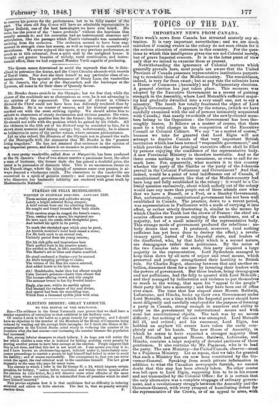ELECTION BRIBERY: GREAT YARMOUTH.
TO THE EDITOR 05' VIE SPECTATOR.
SIR—The evidence in the Great Yarmouth case proves that we shall have a similar exposition of corruption to that exhibited in the Sudbury case.
Of coarse I stick to the ballot as a great remedy for corruption; and I should have no objection to the number of the Members of the House of Commons being reduced by weeding out the corrupt little boroughs: fur I think the House of Re- presentatives in the 'United States acted wisely in reducing the number of its members after the last census—not increasing the number because the population had increased.'
But, among inferior measures to check bribery, I do hope you will notice the law which enables a man who is indicted for bribing avoiding every penalty by proving another person to have been corrupt at the election. People suppose that this is not done, and that this law is not acted •on. I can assure you that it is; and I have known an electioneering-agent, indicted under it, immediately com- mence proceedings to convict a person he had himself had bribed in order to avoid his liability; and of course successfully. The consequence is, that you can never catch the agent, the real criminal next to the candidate himself. The law gives impunity to the man who pays for many votes. The statute to which I refer is the 2d George IL c. 24, which imposes certain penalties for bribery, " unless before coaviction and within twelve months after the election he (the briber, &c.) will discover some other offender of the same kind; upon whose conviction, he is indemnified from all penalties which he shall have himself incurred."
This proviso explains how it is that candidates find no difficulty in inducing attornies and others to bribe electors. The fact is, that no penalty actually


























 Previous page
Previous page